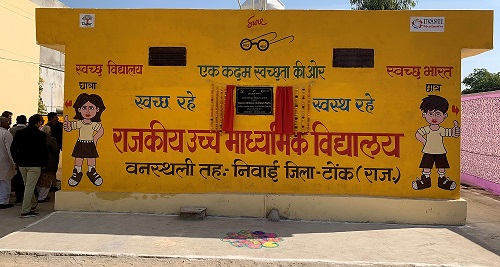Schools are the foundation for children to acquire knowledge and develop a personality. Inclusive and holistic growth of a child relies on various factors, even at the school level. For improved learning outcomes, a promising environment and method of teaching and learning have to be inculcated. Infrastructure, availability of space, learning methodology, availability of nutritious food and awareness of various aspects of life, including civic sense, impact child’s development.
Education is the prime factor in building the human capital of the country. According to the latest Human Capital Index, by World Bank, October 2018, 56% children’s productivity will be less than half of their potential lifetime earnings if they do not get complete education and health. The index urges the governments to ascertain efficient and effective investment in their people. Good, comprehensive education provided to a healthy and strong population will be far more productive in the future.
Infrastructure
School infrastructure is one of the important parameters in the World Bank’s education investment projects. Having the right infrastructure will not only boost the morale of the students but will also motivate them to actively participate in school. Clean toilets, safe drinking water, safe and hygienic space to have the mid-day meal, enough space to play or run around during the physical education period form some of the basic needs which are required to be fulfilled. Apart from this, it is also important to have a kitchen garden, as this will encourage children to learn about nature and develop a sense of responsibility towards it. These kitchens can also be a source of vegetables and spices for the school kitchens.
Other essentials include rainwater harvesting, which will not only provide water for current use but can also be stored for future use.
Digital education
The school education is currently on the threshold of a paradigm shift, from textbook to digital. It is a thoughtful evolution which is transforming official education methodology to explorative erudition process. Government schools are embracing this transformation enthusiastically.
Digital tools empower students to inculcate effective learning skills. They are engaging and helps develop critical thinking skill which further forms the basis of analytical reasoning. Gamification (an interactive learning tool) of the syllabus also motivates them to learn through engaging games and inspire them to work in groups. Interactive tools engaging groups of students lead to increased trust and encourage teamwork and cooperation.
Schools equipped with traditional lecture system in combination with digital learning will enhance the learning outcomes. Digital learning encourages children to think outside their typical learning modes which also inspires creativity while further enhancing productivity. In future, the lecture and notes system may well be an added on to digital learning experience. While that may become a reality, it is imperative that the schools today, introduce digital learning as a matter of course methodology, even as an alternative method of learning. Government school children will get the required exposure to inculcate the ability to explore and learn more through digital learning tools.
The current National Education Policy brings into focus, infrastructure and digital education while promoting interdisciplinary education. Making the basic infrastructural facilities and kitchen gardens its focus, the government has planned various interventions at the school level. Smart classes and digital learning is also high on the Government’s priority list for school development and various interventions are planned around it. A report by UK-India Business Council states that the e-learning sector in India will grow further than 17.4% between 2013 – 2018. With the Government programmes such as ‘Digital India’ and augmented investment on Skill India campaign, seamless insertion of technology in the government education ecosystem is being fostered. A framework for Model Schools has been developed and is in various stages of implementation. Along with the facilities of projectors, screens; tools such as radios, audiovisuals and games are also being introduced to the Government school children.
Collaborative Implementation
Numerous stakeholders have also come forward to participate and contribute to digital education and basic infrastructure at schools. Many NGOs are also working towards building community centres that are furnished with digital equipment for community learning, especially in rural areas. Similarly, NGOs are striving to bring digital learning to schools as well. Akshaya Patra, for example, has installed digital learning equipment and has constructed toilets, provided safe drinking water and other infrastructural requirements through its ‘School Rejuvenation Programme’ under their ‘National Endeavour for School Transformation’ initiative. This initiative is an attempt to bring Government schools at par with private schools and motivate children to attend schools by creating a sense of belonging.
A World Economic Forum research approximates that 65% of children entering primary education will be in occupations that do not exist today. It clearly implies that education eco-system needs to equip its children to face the digital world. With combined efforts of Governments, NGOs and other stakeholders, India’s children will be ready for their future in the digital age.
Views of the author are personal and do not necessarily represent the website’s views.



 Mr Shridhar Venkat is the CEO of The Akshaya Patra Foundation. Shridhar worked with leading multinational companies for 25 years before he joined The Akshaya Patra Foundation. He gave up his corporate career in search of ‘existential purpose’ in life and joined the foundation. He has been working with the foundation for 13 years now.
Mr Shridhar Venkat is the CEO of The Akshaya Patra Foundation. Shridhar worked with leading multinational companies for 25 years before he joined The Akshaya Patra Foundation. He gave up his corporate career in search of ‘existential purpose’ in life and joined the foundation. He has been working with the foundation for 13 years now.